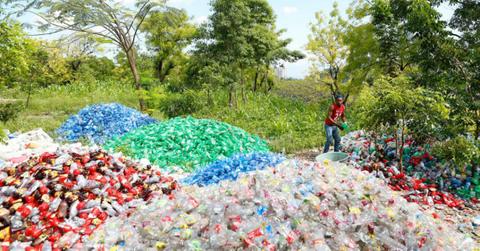These Major Companies Are Banding Together To Make Products From Ocean Plastic
HP and IKEA are the latest brands to join NextWave Plastics, an initiative to make ocean-bound plastics into products.
Updated Nov. 19 2020, 9:39 p.m. ET
This week, IKEA and HP Inc. joined a group of retailers tackling ocean pollution through their supply chains. The two companies are the latest members of NextWave Plastics, a collaborative effort to minimize the amount of plastic entering our oceans by capturing it and turning it into new products.
That effort starts on beaches and canals, where discarded plastic can easily drift into waterways. NextWave Plastics collects those items from countries spanning Indonesia, Haiti, Chile, Cameroon, Denmark, and the Philippines, then transforms them into raw materials for member companies. They might become board games for Bureo, which sells a version of Jenga made from fishing nets. Or they could form ink cartridges for HP.
Through this work, NextWave Plastics hopes to divert at least 25,000 metric tons of plastics from the oceans by 2025 — an amount equivalent to 1.2 billion single-use plastic water bottles.
The group formed last year in response to the UN’s Sustainable Development Goal 14, which seeks to conserve and sustainably use oceans, seas, and marine resources. NextWave Plastics was initially a joint effort from Dell and The Lonely Whale, but as of this week, it has 10 companies committed to the mission of developing the first global network of ocean-bound plastic supply chains.
That full list includes Dell, The Lonely Whale, Bureo, GM, Herman Miller, Interface, Trek Bicycle, Humanscale, and now, IKEA and HP.
"As we’ve become more engaged in the challenges facing our oceans, it’s become increasingly clear that the solution to marine plastic pollution requires bold innovation and open collaboration," said Kevin Brown, chief supply chain officer at Dell Technologies, said in a press release.
"No company can solve this issue alone, and we are excited to welcome new member companies to the cause and continue to encourage others to work together to further advance NextWave’s mission and prevent even more plastic from entering the ocean."
HP has already made upgrades to its supply chain through its work with Thread, a certified B corporation that sources waste from low-income communities. This trash provides both raw materials for new items and economic opportunities for local workers, such as plastic collectors in Haiti. They now supply HP with a steady stream of plastic bottles, which can be upcycled into ink cartridges.
HP claims it’s already more than 550,000 pounds of plastic from Haiti through this partnership, keeping more than 12 million plastic bottles out of the Caribbean Sea.
IKEA announced similar, if vaguer, intentions this June, when the furniture company pledged to design its products with new “circular principles,” aiming “to only use renewable and recyclable materials” by 2030. It will also eliminate single-use plastics from all stores by 2020.
NextWave Plastics will start sourcing plastics from at least three more countries by 2025. According to the press release, it’s currently eyeing Taiwan, India, and Thailand for this expansion. But as the network adds new locations with the same pollution problem, NextWave hopes to find innovative uses for the plastic it collects, experimenting with different types of material and design to lead the way towards more sustainable manufacturing.
